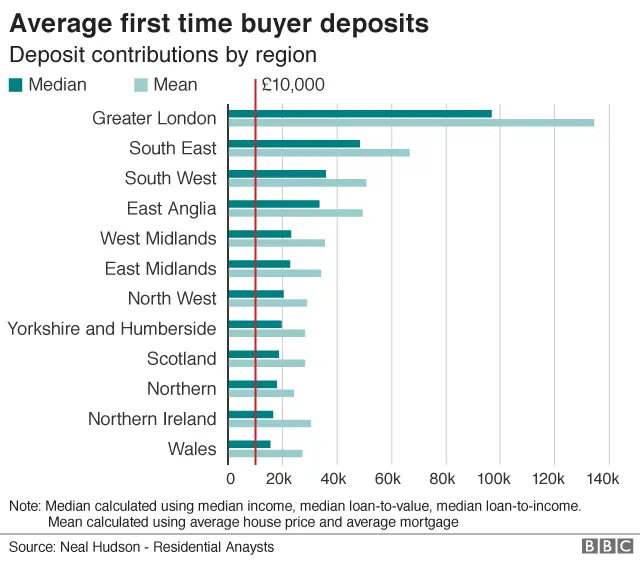What can you get for £10,000?
 Getty Images
Getty ImagesThe Resolution Foundation has proposed that 25-year-olds be handed £10,000 to help reduce inter-generational unfairness.
But before you start planning to splash the windfall, bear in mind that it can't be spent on just anything.
It's suggested that the cash should be used only for worthy things, such as a home, pension, education or a business.
Will £10,000 really make a huge difference or is it simply too small to really help millennials?
Here we look at the four options for the cash.
1. Pay for a deposit on a home
Sadly, £10,000 won't get you very far these days if you're a first-time buyer.
At best, it'll be about half the amount you'll need for a deposit on a home, but only if you live in the northern part of the country. For Londoners, it represents only one-11th of an average deposit amount.
According to the Halifax, the average first-time buyer deposit hovers around £20,000 in Scotland, the North, North West, Yorkshire and Humberside and Wales.
It climbs to about £25,000 in the Midlands and £35,000 in East Anglia and the South West.
If you're hoping to buy a home in the South East, then £10,000 will be only one-fifth of the £51,000 deposit you'll need.
Meanwhile, it would hardly be of help at all to Londoners, who need to find an average £112,000 deposit.

2. Start a business
Some 414,000 new businesses started in the UK in a year, according to the latest official figures from the Office for National Statistics.
It means those thinking of setting up on their own face a lot of competition and survival rates aren't high.
About 328,000 businesses fold in a year, with some estimating that only half of new start-ups will survive for longer than five years.
Will £10,000 give someone a head-start in helping their business to be a success?
Even only taking account of setting-up costs, such as accountants' fees, legal expenses, HR overheads and general administration, the average UK start-up spends more than £20,000 in its first year.
But that leaves out the cost of buying stock or developing a product. Depending on what your bright idea might be, opening expenses could run to hundreds of thousands.
But the picture may not be that bad, as the proposals suggest that the cash should be used in conjunction with recognised entrepreneurship schemes.
There is a range of loans, grants and funding offered across the country and if you are eligible for any of them, having a £10,000 top-up could actually help.
3. Pay for education
 Getty Images
Getty ImagesOne suggested use for the cash is for it to be used to fund education, training or even pay off tuition fee debt.
The latest figures from the Institute of Fiscal Studies suggest that a student will graduate with debts of £50,800.
However, those from the poorest backgrounds, with more loans available to support them, will graduate with debts of more than £57,000.
So if you use the £10,000 to pay off tuition fee debt, you'll only clear, at best, one-fifth of the total, or just one-sixth if you're from a poorer background.
However, you may be better off not paying off the debt, as MoneySavingExpert Martin Lewis argues.
What about using the money to gain a new skill or get extra training?
Professional training is not cheap. A day's sales, IT or finance training, for instance, can cost between £500 to £1,000.
If you want to be a pilot - one of the most expensive jobs to train for - you'd need to find nearer £120,000 to cover the cost of getting qualified.
So while £10,000 will certainly help a millennial with education or training costs, it is unlikely even to get close to covering the full expense.
4. Put it into a pension
If you're 25, is it worthwhile stashing £10,000 into a pension?
Tom McPhail, pensions expert at Hargreaves Lansdown, has crunched the numbers for the BBC to calculate how much the money would be worth by the time a 25-year-old retired at 68.
He reported that assuming a net real return of 2.5% after charges, the £10,000 in your pension would be worth about £33,500.
Of all the options, it may make the most sound financial sense.
"The key to building a decent pension is to start early and invest well," said Mr McPhail. "The more you pay in, the more you'll get out, but you can also improve your prospects through the magic of long-term compound investment growth."
But bear in mind that once you've stashed the cash in a pension, you won't be able to get at it until you reach the age of 55.
 AFP, PA
AFP, PA
Are you 25 or under? How would you spend a £10,000 windfall? Share your views and experiences by emailing [email protected].
Please include a contact number if you are willing to speak to a BBC journalist. You can also contact us in the following ways:
- WhatsApp: +447555 173285
- Tweet: @BBC_HaveYourSay
- Send pictures/video to [email protected]
- Upload your pictures/video here
- Send an SMS or MMS to 61124 or +44 7624 800 100
